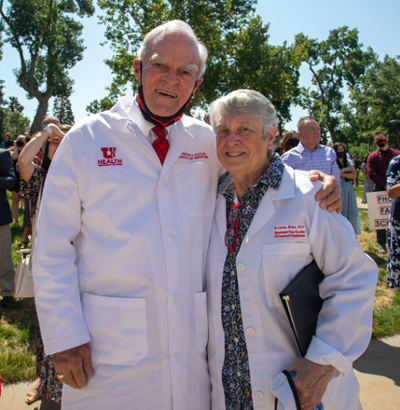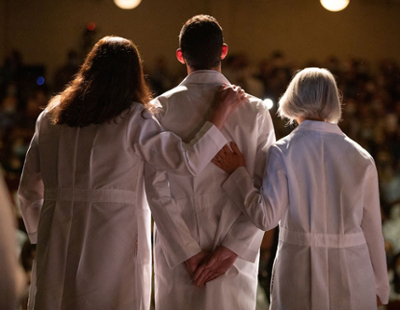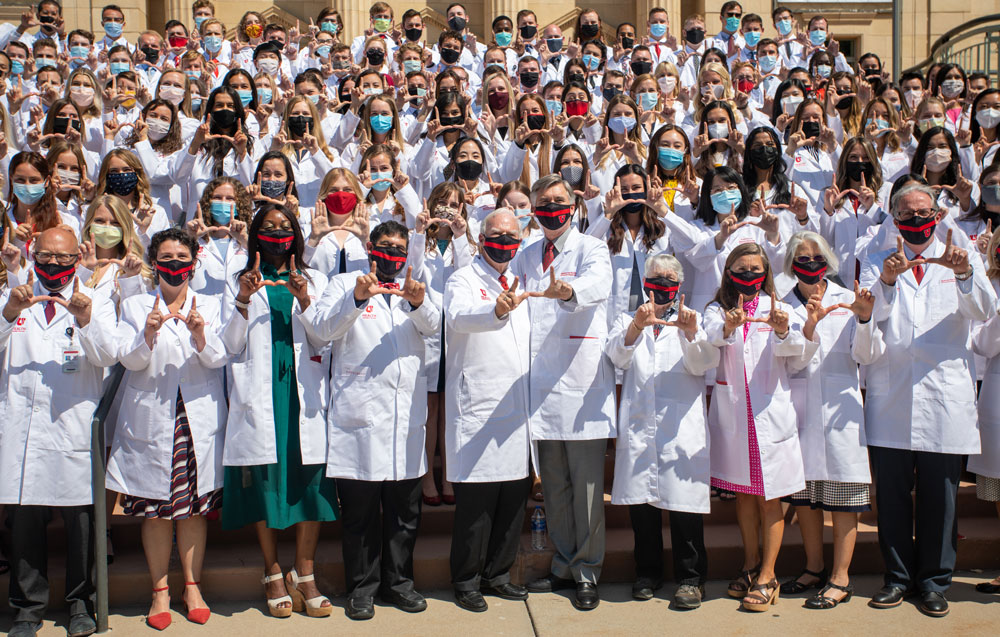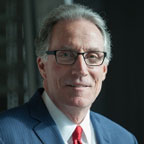Voices of U of U Health
Beginning the Journey to Become a Doctor
The traditional White Coat Ceremony commences one of the most remarkably transformative journeys in higher education: transformation from “pre-med” to “doctor.” The University of Utah’s incoming medical school Class of 2025 represents some of our best and brightest minds—a cohort of 74 female and 51 male students selected from nearly 4,000 applicants. Over the next four years, they will be part of an intimate learning community with excellent mentors who will prepare them to deliver high-quality, compassionate care in all communities and populations.
A Ceremony to Remember

for the Class of 2025.
We were pleased to have Spencer Eccles and his daughter Lisa Eccles in attendance for the 2021 White Coat Ceremony. Earlier this summer, the university announced a landmark gift of $110 million for our School of Medicine from the George S. and Dolores Doré Eccles Foundation and the Nora Eccles Treadwell Foundation. In honor of this historic gift and a lifetime of leadership, vision, and advocacy, the university has renamed our medical school—making the Class of 2025 the first entering class of the Spencer Fox Eccles School of Medicine at the University of Utah!
Every time they put on the white coat they received at the beginning of their medical school journey, trainees are reminded of their central obligation to care for the patient. We are grateful to the Eccles for their generosity and commitment to the success of our students and future health of our state.
Another special guest at this year’s ceremony was keynote speaker Kristen Ries, MD, MACP. A renowned infectious disease specialist, Ries faced an inordinate obstacle—or, as she calls it, her own pandemic. She arrived in Utah on the very same day in 1981 that the Centers for Disease Control and Prevention released a report about a new infectious disease affecting gay men.
She became the first physician in Utah to provide compassionate care and treatment for patients with this stigmatized disease called HIV/AIDS. Ries went on to establish Utah’s first comprehensive treatment program for AIDS patients at the former Holy Cross Hospital.
In her address entitled, “Expectations, Challenges, and Rewards,” Ries talked about the values and characteristics she believes are needed to make a good physician in today’s rapidly changing environment.
Seek Out Mentors

Ries advised students to seek and rely on the support of mentors all around them—including faculty, administrators, fellow students, and student leaders. University of Utah Health offers many resources for medical students. The Mentor Connection program, for example, allows students to explore different surgical specialties and practice environments, and establish mentor/mentee relationships that can serve as a source of future career guidance and sponsorship.
Trainees need to be proficient at both the art and science of medicine, Ries emphasized. “The humanity, or art of medicine, is hard to quantify or measure,” she said. “But you will know it when you see it!” That’s why it’s important to seek mentors who excel in the technical aspects as well as patient care side of medicine.
“Never overlook the patient,” Ries counseled. “The patient is why we are here [and] you will often learn something from a patient that is later proven by science.” She shared one of her favorite quotes from 19th-century physician Edward Livingston Trudeau: “The art of medicine is to cure sometimes, to relieve often, and to comfort always.”
Technology and Judgement
Computer systems, with or without artificial intelligence (AI), have advanced far beyond data collection and record-keeping. They are integral to delivering patient care. But ultimately, Reis explained, the digital technologies we use are only as good as their input. She urges the new medical generation to: question things presented to you; use your critical thinking skills and judgement; and be an active part of your profession.
Improving Systems and Ending Stigma

Ries concluded her keynote by issuing a challenge to Class of 2025. “The science of medicine is moving at exponential speed, posing unexpected and new challenges every day,” she said. “We should ask ourselves how we can improve upon this advanced but imperfect system.”
For instance, our trainees can have a real impact on overcoming bias and stigma. “Stigma is truly the enemy of health care,” Ries stressed. We saw it happen in the 1980s with the AIDS epidemic and we are seeing it now with the coronavirus pandemic. “As difficult as it is to be entering medicine at this time, I urge all of you to be fully engaged in helping to change this ugly part of our humanity.”
We are excited to embark on this new journey with the Class of 2025. We look forward to what we will teach them and what they will teach us, along their path to becoming a physician.
